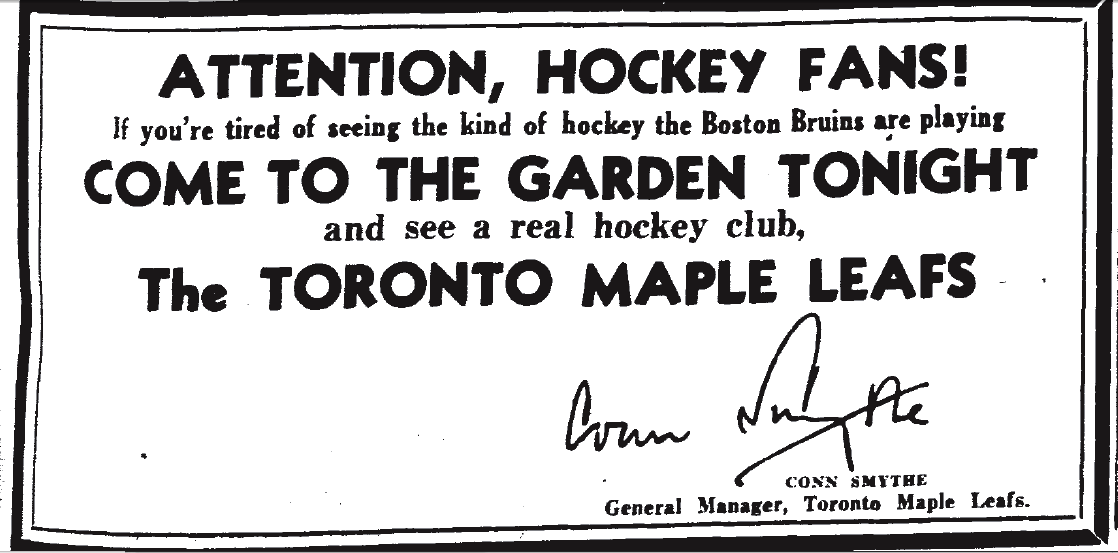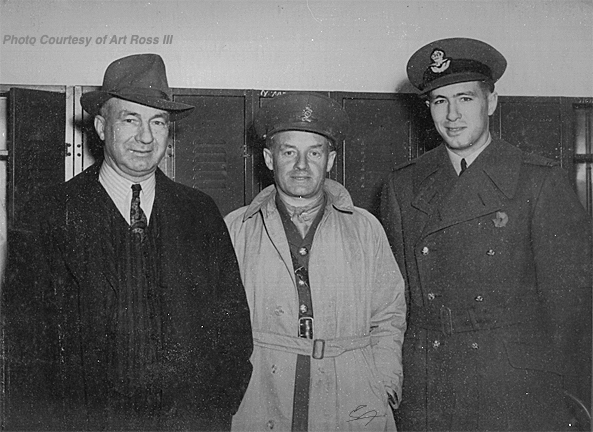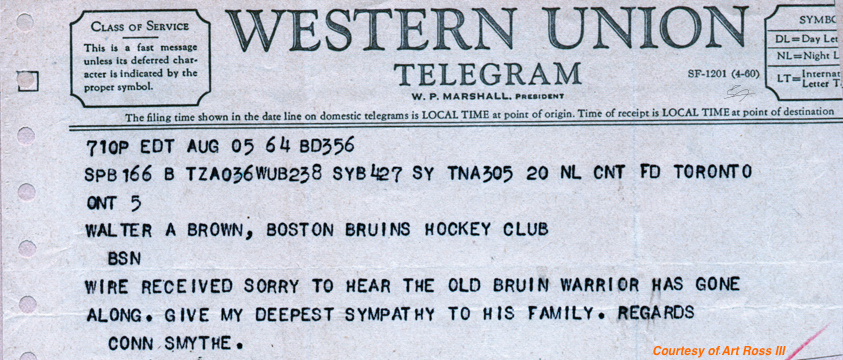Art Ross and Conn Smythe didn’t like each other. You’ll sometimes read that the feud between the two men was staged to sell tickets. It certainly seemed to help the box office, and maybe they played it up in the years after World War II, but it seems to me that they truly disliked one another throughout the 1920s and ’30s.
There are many theories as to what sparked this hatred. I go into greater detail about much of this in my book Art Ross: The Hockey Legend Who Built the Bruins, but the leading contenders seem to be:
- Smythe mocked the first-year Bruins on a trip to Boston with his Toronto Varsity team in 1924 and Ross never forgave him
- Ross duped Smythe into trading for Sailor Herbert for the Maple Leafs in 1927 and Smythe never forgave him
These and many other petty reasons no doubt added up, but I think they were just two strong personalities who each wanted what was best for themselves and their team and damn anyone who got in the way.
One of the last great flare-ups in the Ross-Smythe feud occurred on this week back in 1939 when Conn Smythe showed up at the office of the Boston Globe. The defending Stanley Cup champion Bruins would be the NHL’s highest scoring team by far during the 1939-40 season, but Smythe was spewing venom about the Boston’s boring defensive play in a 1-1 tie in Toronto a few days before. As quoted in the Globe on December 19, 1939:
“First of all, I want to put a paid advertisement in your paper to let the fans of Boston know that they can see at least one great hockey team in action [to]night.”

“Mind you, we’ll get no financial return from this ad because the visiting club doesn’t get a share at all in the receipts. But if we’ve got to carry the whole National League while the other clubs fall asleep and try to scare the customers away, then we’re willing to put out the dough.
“I’m referring particularly to that game the Bruins played in Toronto last Thursday night. That, my friends, was a living disgrace. It was a perfect exhibition of how to drive the customers away in droves. Sure, I know the Bruins have lost Eddie Shore and Roy Conacher, but they’re still the champions, aren’t they? Everybody calls them champions. Why can’t they play like champions then, both on the road and at home?
“We have anywhere from 500 to 1000 fans from Kitchener every time the Bruins are in town to see the Sauerkraut Line. All they saw last Thursday night was the ‘Sauer’ part…. I guess Ross is so busy inventing things that he doesn’t find time to make his players play hockey… Well, if that’s the way they want to play, we’ll carry the load and show the customers hockey as it should be played.”
Smythe’s outburst helped to attract a crowd of 14,107 to the Boston Garden that night. It was the largest crowd of the season to that point, and they saw the Bruins score a 3-2 victory in overtime. Ross later demanded that the NHL fine Smythe $1,000 for his conduct. The issue was raised at the next league meeting, but was dismissed. Instead, a motion was passed censuring both Smythe and Ross for their unseemly bickering over the years.

Art Ross, Conn Smythe, and Art Ross Jr.
Soon after, Ross’s sons Arthur and John enlisted in the Royal Canadian Air Force. Smythe was a World War I veteran who would re-enlist during World War II. “I was a little sorry about having been on [Ross] all the time when his sons came up and joined the RCAF,” Smythe would write in his autobiography. “We weren’t so hard on one another after that.”
The feud did seem to abate as the years went by, though the two men probably never liked each other much. Perhaps, though, there was at least some level of mutual respect. At the end of my book, I mention a telegraph that arrived at the Boston Garden following Ross’s death on August 5, 1964. Here it is:

And, in light of the recent decision by Baseball Commissioner Rob Manfred on Pete Rose, a link to my story from February 18.
Interesting insight and a GREAT photo!
Do you think Ross was behind the Rangers’ replacing Smythe as their GM with Lester Patrick on the eve of their first season? After all, Ross and Patrick were old high school buddies, almost like brothers (Frank Patrick was in Ross’ grade). Apparently, Rangers originally hired Smythe to assemble the team in part because of a recommendation from Bruins’ ownership, and certainly Ross had their ear.
Hi Bob,
Of course, I don’t have any first-hand knowledge of this, but here’s what I wrote in my Art Ross biography:
As to the feud with Smythe, Art Ross’s son John believed it actually started when Ross convinced New York’s John Hammond to dump Smythe in favour of his friend Lester Patrick shortly after Smythe had been hired to head up the Rangers when they joined the NHL in 1926–27. {iTune JKMR} That, however, is somewhat contradictory to the many stories that claim it was Charles Adams who’d recommended Smythe to Hammond in the first place.
In the 1933 interview with Carens, Smythe doesn’t say that Ross was behind his ouster in New York, but does say that: “When I joined the National Hockey League, Ross told me a college coach would not last in big league company. He said he’d run me out of the league in a year and a half.” {Shore Hiam p216}
Now, John Ross died several years before I got started on the book. Art Ross III had various audio tapes he’d made with his Uncle John over the years. I have old iTune versions of some of them, which I listened to now … but didn’t come across him telling that story! Must be in something, or maybe it’s only in a tape I heard with Art III — who’s been dead for a few years now, so I can’t ask him. But, John Ross does say he didn’t spend much time with his father in the early days, (Smythe being fired would have happened while the family was still living in Montreal), so no way he remembers this first-hand. And he gets plenty of facts wrong in many of the stories he tells!
Smythe would probably be a more reliable source … but I don’t have a first-hand account of that interview with George C. Carnes; I only saw it in C. Michael Hiam’s book about Eddie Shore. Still, here’s what Smythe had to say about being fired in New York in his 1981 autobiography, If You Can’t Beat ’Em in the Alley (which came out after he died):
If I’d been a politician, I would have stuck with them. But I was no politician. The word was getting around that the Rangers couldn’t be much, because so few of them had ever played pro hockey. I wasn’t worried. I knew the calibre of the rest. But [Rangers president] Colonel [John] Hammond didn’t. Babe Dye had been a big scorer with Toronto St. Pats for years. He was offered to me, and I turned him down. Colonel Hammond called me and practically ordered me to sign Dye. I refused. ‘He wouldn’t help this team one day,’ I said. He wasn’t my kind of player, too much the individualist, not enough of a team man…
Anyway, after enough other big wheels in the NHL kept telling Hammond that he should have picked up Dye when he had the chance (instead of letting him be sold to Chicago), I guess he thought he’d better replace me with someone more likely to do what he was told.
Ross might well have been one of those other NHL “big wheels” harping on to Hammond at the time, but I feel like Ross would have mentioned him by name if he was! And, frankly, I have my doubts that Charles Adams would have known enough about Smythe to recommend him to the Rangers in the first place, and that if there’s any truth to that, it’s as likely as not that Adams would have asked Ross what he thought about it.
I guess this is really just a long way of telling you I don’t really know. And, I don’t like to guess. Plus, I’ve mostly found that all the old hockey stories we know have been “broken telephoned” so badly as to make them almost completely untrustworthy if you can’t verify them somehow. So, while it’s possible Art Ross was behind Smythe being fired in favour of his buddy Lester Patrick, we’ll never know for sure. And, finally, Adams must have spent so much time negotiating with Lester and Frank over the sale of WHL players to the NHL that he would have known them well enough (and certainly better than he would have known Smythe!) to have suggested Patrick to John Hammond himself.
Hope this helps somewhat…